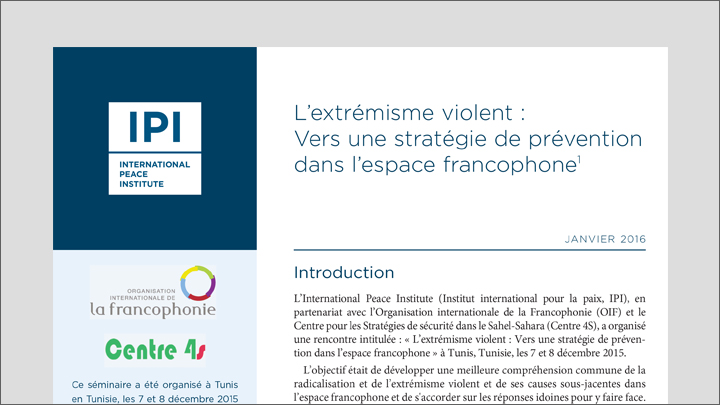 Violent extremism has become a dominant problem in the Sahel-Sahara region in the last couple of years. An increasing array of nonstate actors are threatening the state and the safety of populations while at the same time taking on a transnational character and increasing ties and affiliations with actors beyond the francophone space. Despite the urgency of this critical threat, current responses of states in the region seem to be uncoordinated and inadequate.
Violent extremism has become a dominant problem in the Sahel-Sahara region in the last couple of years. An increasing array of nonstate actors are threatening the state and the safety of populations while at the same time taking on a transnational character and increasing ties and affiliations with actors beyond the francophone space. Despite the urgency of this critical threat, current responses of states in the region seem to be uncoordinated and inadequate.
This meeting note, written in French with an English summary included as an annex, aims to contribute toward better mutual understanding of violent extremism in the Sahel-Sahara region and its underlying causes. It also outlines a number of potential regional, national, and community responses.
The report stems from a seminar IPI organized in Tunis, Tunisia, from December 7 to 8, 2015, in partnership with the International Organisation of La Francophonie (OIF) and the Centre for Strategies and Security for the Sahel Sahara (Centre 4S, Nouakchott, Mauritania).
The following are among the recommendations that emerged from the seminar’s discussions:
- Analyze, Disseminate, and Communicate: Local actors could benefit from greater access to research, analysis, and lessons learned from other contexts. In addition, local researchers could be supported in developing their own knowledge and narratives, and media could be encouraged to adopt a more positive and analytical approach to covering violent extremism.
- Promote a Culture of Dialogue and a Dialogue of Cultures: A culture of dialogue must be promoted both between and within different cultures and religions, as well as between the state and religious actors. This dialogue should extend to the regional level.
- Rethink State-Society Relations: Increased space for dialogue among different actors in society is needed to help the state engage in more long-term preventive solutions. Such solutions could include reaching out to youth and preventing the manipulation of religious discourse.
- Invest in Prevention: Regional integration could help find common preventive strategies for the francophone space. This integration should not be limited to cooperation among states.







